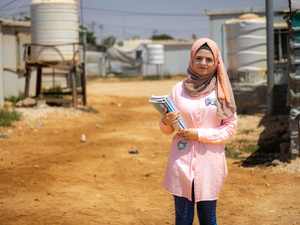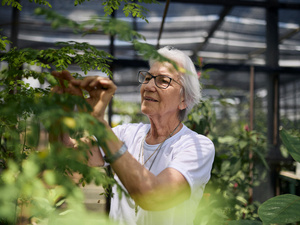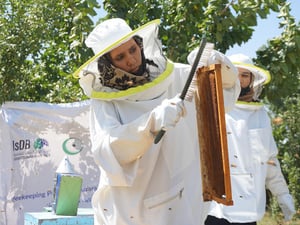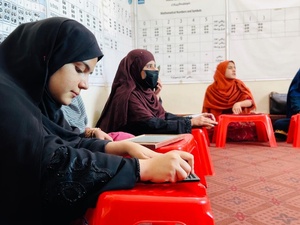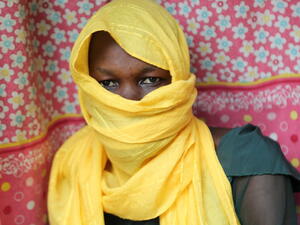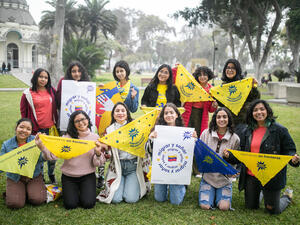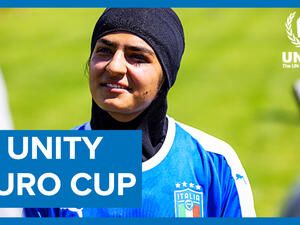UNHCR helps women raise their voice in Somalia's Puntland
UNHCR helps women raise their voice in Somalia's Puntland

An attentive class at the workshop in Galkayo.
GALKAYO, Somalia, October 15 (UNHCR) - A dozen female students wearing brightly coloured head scarves listen attentively to their teacher in a whitewashed classroom daubed with slogans such as: "Learn today, teach tomorrow" and "War is the father of evil."
The women, who have come to this town from all corners of northern Somalia's Puntland region, are taking part in a three-month course aimed at giving them the skills to effectively and efficiently run a non-governmental organization (NGO). It also has another purpose.
"This workshop empowers women so that they can have an impact on their own lives as well as on society," explained 45-year-old course participant Asha, who runs a small NGO dedicated to peace-building. "Men have had the power forever and all we got is a country devastated by conflict and poverty. Women would provide much better governance than men because our society is based on family, in which women have the main experience," she added to approval from her classmates.
The course is being organized by the Galkayo Education Centre for Peace and Development (GECPD) with the support of the UN refugee agency. It aims, specifically, to teach the women how to define an NGO's mandate, request funding and ensure accountability.
The participants approach the course with enthusiasm. Most of them already serve their communities by working for NGOs. They clearly want to make a difference and improve life for women in a deprived and volatile area of the world.
"Listen to them, these women are the real voice of Somalia, they know the needs of their communities perfectly and they have a real commitment to bring change," Hawa Aden, chairwoman of GECPD, said with pride in her voice.
As Aden visited the classroom with a UNHCR guest, the students took turns repeating the lesson of the day - an exercise aimed at developing public-speaking skills. This will help them in their particular areas of NGO work, including peace-building, women's rights, female genital mutilation and education for girls. Asha told the class how she had helped bring together rival sub-clans for peace talks.
"Women are the foundation of Somalia, the ones who make the building stand, but they need to be taught how to lead. What we learn today will benefit Somali women and their country tomorrow," said 19-year-old Ayan, who recently completed her secondary education and joined a women's NGO. She now works as a counsellor for female victims of sexual abuse.
"Violence against women happens daily in my country," she said, noting the prevalence of rape and female genital mutilation. "Who better than women can help put an end to that violence, provided they receive proper training?"
Farhia, 36, who runs a small NGO caring for street children, said nothing was more important than empowering women in a conflict-ravaged country where females raised the children and were often the sole breadwinner. "I was able to survive only because I had skills as a teacher," said the mother of nine, whose husband divorced her. "Now I am sending all my [seven] daughters to school because I want them to have an easier life," she added.
Aden, whose award-winning NGO also runs a primary and a secondary school for girls in Galkayo, noted that when she was young Somali girls were encouraged to study. "But after years and years of war, all that a girl is asked [now] is why she is not married yet," she said.
"Mothers believe their daughter will have a better life if she finds a husband fast," Aden said, adding that in reality divorce often followed. "If the girl has not acquired enough skills to have a decent job, she will be unable to feed her own children and she will end up living in squalid settlements outside town," added Aden.
The GECPD tries to keep its girls in school by letting them spend half their time studying and the rest working. The NGO also teaches them about issues such as violence against women and children, HIV/AIDS, peace-building and female genital mutilation. "Each time a little girl dies in town because of that harmful practice, we tell all our students," Aden said, adding that most of the girls in her schools had undergone genital mutilation.
Later gathered for lunch, the workshop students chatted happily among themselves. "When I see this nice food on the table, I am not satisfied because I know many people in my country are starving," one of the students said, while adding: "When I think about all the skills I have acquired over the past month, I feel a little relieved because I think I might be able to be part of a solution."
Galkayo, one of the largest cities in Puntland, hosts an estimated 50,000 internally displaced persons.
By Catherine Weibel in Galkayo, Somalia

